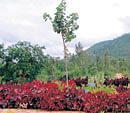
This stretch of land covering Channarayana Durga and Devarayana Durga is a good place for bird watchers as well. This hill is the habitat of the Yellow Throated Bulbul. Siddhara Betta is considered to be a paradise for nature lovers and adventurous trekkers. The hill is also home to several medicinal plants of rare species.
According to pontiff of Rambhapuri Balehonnur Shakhamutt Veerabhadra Shivacharya Swamiji, the hill came to be called Siddhara Betta as 9,000 siddhas (holy men) meditated, worshiped Lord Shiva and gained moksha(salvation).
Home to medicinal plants
While Siddhara Betta itself is home to medicinal plants, none of the surrounding hillocks are known to have any medicinal plants. It is said that the hill was home to thousands of saints who came here to meditate. Even today, sand, dust and ash can be found in all the caves. The State Revenue Department has recorded the same. Several saints from North India come down to Siddhara Betta every year and spend some time meditating. They say that they feel the same vibration which they have felt in the Himalayan region while meditating, adds Veerabhadra Shivacharya Swami.
There is a pond at the Shiva temple which never goes dry even in the most severe of summers. Water level in the pond is known to dip after sunset and increase after sunrise. Former prime minister Atal Behari Vajpayee sent a research team to study the water of the pond.
The expert, after the tests, concluded that the water had great medicinal powers and if consumed regularly, it would cure long standing diseases, the seer points out. In fact, political veterans of yesteryears including the late Veerendra Patil, Kengal Hanumanthaiah, Devaraj Urs and J H Patel were known to drink from the water of this pond.
Ayurvedic centre to be set up
Seer Veerabhadra Shivacharya Swami who hails from Abbigereri in Gadag district is sowing seeds of change in the lives of rural folk. He has set up a hostel providing free accommodation and food to students of drown trodden community.
Speaking to Spectrum, he explained, “I noticed that the entire area lacked basic amenities and people had little awareness when I first came here. I decided to implement various projects for the welfare of rural folk. I concentrated on imparting education, conducting regular discourses and to organise health camps.”
The first step was Beladingala Koota on Buddha Purnima Day (full moon day) two-and-half years ago.
Later, he invited experts like university professors, scientists and writers to deliver lectures on contemporary issues. Soon, free medical and health check up camps followed.
“Like the goshala of Ramachandrapuramutt and the free hostel of Siddagangamutt, I want to set up an Ayurvedic College and Research Centre here. The Centre will have the biggest library in the country with books on Ayurvedic science. I will organise exhibitions of medicinal plants. Experts from all over the country will be involved in this. The Centre will have a collection of rare medicinal plants that are available all over India. The proposed Centre requires at least 15 acres of land. The process of acquiring land has already begun,” he reveals.